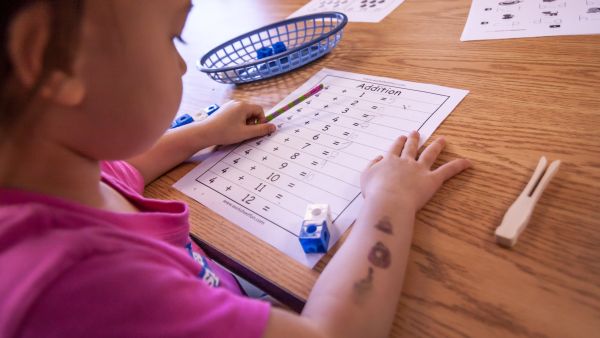
Every parent has heard the news: The tech boom of the last two decades has produced industries hungry for employees with strong math and science skills. And yet, while standardized math scores for U.S. students are higher than they were decades ago, they’re still lagging behind nearly three dozen countries in international rankings.
Uncle Sam needs you! More specifically, he needs you to raise math savvy children. Check out these effortless ways to prepare your preschooler for calculating like a pro.
Point Out Patterns, Puzzles, and Position
Promoting early math doesn’t always involve painful calculations. A strong spatial sense and an ability to quickly identify patterns are two qualities that are often found in students with strong math skills. Toddler-safe building blocks are wonderful tools for this task. Pressing together two right-triangle-shaped blocks into one larger square is the sort of effortless play that improves spatial sensibility. Older children can advance this skill by tackling high-piece-count puzzles.
The next time you pass a pet store with your preschooler, ask him which of two Dalmatian puppies has more spots, or which window has more pets in it. This kind of estimation and assessment strengthens the ability to recognize patterns.
Show ‘Em The Money
Nothing makes math more relatable than actually using it. You calculate costs every day, why not let your preschooler in on the magic? Let him count out several quarters and two pennies to offer the correct change for a purchase, at least when there isn’t a huge line at the coffee bar. At home, dig up all the spare change in the cushions, catch-all bowls, and drawers of the house and spend a little time sorting it. Show how high a tower of pennies you have to make to be equal in value to one single quarter.
Cook Up Some Fun
Fractions, fractions, fractions. So simple . . . and so not, for many fourth graders. Consider boiling down the concept by revealing how they’re used in everyday life. How many half cups of flour make one cup? How many teaspoons in a tablespoon? If there are four guests but eight pieces of pie, how much of the pie will be left when the guests finally leave?
Plan A Family Game Night
Kids learn best when learning is fun. There are dozens of board games for all ages that strengthen math skills. Consider taking advantage of the millennial screen culture by allowing educational video games (in moderation, of course!). Someday, your math-savvy child may even create one.





















